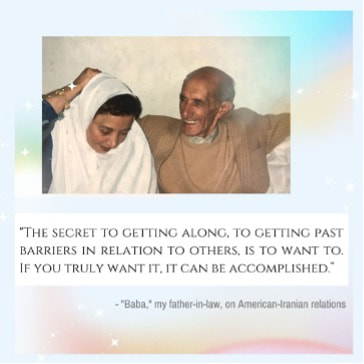|
“Baba”—that is one of the first words I learned in my Persian class at Ohio State after marrying my Iranian husband Mahmoud. The word is the equivalent of “Daddy” in Persian. And that’s what I came to call my father-in-law when we moved to Iran in 1992 (In a similar vein, I came to call my mother-in-law Maman too). You would think I’d have noticed that Mahmoud and his siblings addressed their father as Aqa (“Sir”), as was common practice for children to do in Iran at the time, but no, I did not! And no one ever corrected me—including Baba—so, happily for me, the name Baba stuck! (Of course, while Baba never took the place of my father, it was such a comfort to have a father figure like him to look up to while in Iran.)
And just as I called him “Baba,” so I treated him as would a very young child who looks up to her daddy with simplicity and trust—asking him anything and everything that came to mind in my very basic Persian. I asked him to explain lessons to be learned from different figures loved and revered by Jews, Christians, and Muslims alike-- figures like Abraham, Moses, Joseph. I asked him if it was really true that in Islam men were permitted to have more than one wife. I even asked him what he thought would happen at death to a person like me who loved God but was Christian rather than Muslim. His candid answers usually surprised, often amused, and consistently delighted me. Part of the reason is that with every response I always saw love, acceptance, and often a fun-loving spirit in his eyes. And I couldn’t help but recognize my husband’s deep-ridged smile and shining eyes in his father’s. In these deeply troubled and troubling times, how I wish Baba could be here to answer my questions, to share his heart, his wisdom, his example. He is no longer with us. And yet… …I still remember the day I asked Baba what he thought was the secret to our two countries (i.e., Iran and America) getting along, given the ongoing history of tension between our two governments. I can still hear the thoughtful pause before his answer, then his slightly crackly voice, then his simple words resonating: “Ms. Leslie, the secret to our two countries getting along … is for them to truly want it.” Wow. Such a simple answer. And yet rife with profound challenges and implications. Not just for Iran and America, but for so many parties throughout the whole world. Like between countries at war, between spouses or among other family members, between people of different faiths—even in the relationship between God and me. My dear Baba—he showed us how it worked. As the American saying goes, “The proof was in the pudding.” Little did I know then that “Baba,” (whom everyone outside the family called Firooz Khan [“Sir Firooz”]), was famous across multiple surrounding regions for the kindness and wisdom he shared with those who sought it—how he was frequently asked to be an arbitrator when differences between parties seemed irreconcilable. He had a gift—and heart—for helping others understand the benefits inherent to people getting along with each other … and the unlocking power behind truly wanting it. Baba, I miss you! We could truly use your example and wisdom now in the world.
0 Comments
Leave a Reply. |
AuthorDr. Leslie Ahmadi discovered her intercultural calling in her parents’ home at age four--where between the jazz, the spirituals, and the rock ‘n roll music, she heard folk songs in languages from around the world. Thirty years later she had a doctorate in foreign language and culture education--and her folk song guitar never far away. Archives
July 2024
Categories |


 RSS Feed
RSS Feed